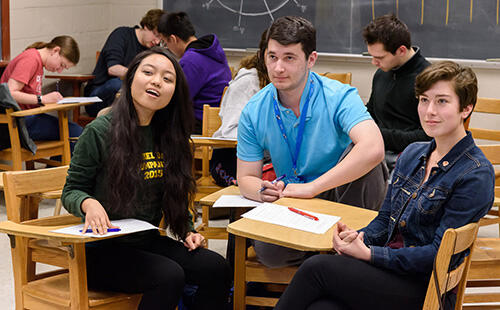Estimathon: A contest of logic and strategy
Team PChem — Physics major Dimitri Lezcano and Chem major Kathalyn Urquizo — snatched first place in the second annual Estimathon that saw science, Math and two Business Administration majors dipping deep into their information wells and mustering every ounce of their skills in logic to answer 13 questions.
PChem, the only two-person team in a roomful of trios, snatched first place in the second annual Estimathon that saw science, Math and two Business Administration majors dipping deep into their information wells and mustering every ounce of their skills in logic to answer 13 questions.
For 30 minutes, the room filled with a low hum as the students collaborated with team members. They jotted down notes and numbers. Argued. Agreed. Calculated. Ran answers on slips of paper to the front of the room. Groaned at “wrong” and cheered “correct!” as they watched the scores change in real time on the projected spreadsheet.
With two minutes to go, the answer runners were tripping over each other in the race to win. Then, the buzzer rang. The aroma of pizza replaced the tension-filled air of competition.
Kathalyn Urquizo, a junior Chemistry major from Germantown, Md., and Dimitri Lezcano, a junior Physics major from Randallstown, Md., answered the most questions with the least variation in range to win in the final seconds of the game.
A close second, almost as if by an act of fate, was the all-Math-majors team of Second Derivatives — juniors Angel Tuong from Anaheim, Cal. and Tim Banks from Owings Mills, Md., with senior Darby Bortz from Frederick, Md.

Second Place: The all-Math-majors team of Second Derivatives, Angel Tuong (l-r), Tim Banks and Darby Bortz, took second place in McDaniel's Estimathon.
Compared to quantum theory, calculus and the molecular structure of DNA, the questions weren’t even that difficult. And they all reflected McDaniel’s new “Climb higher. See farther.” branding:
• The difference in elevation (in feet) between McDaniel College in Westminster and McDaniel Europe in Budapest.
• The course record (in minutes) for the Empire State Building Run-Up.
• The total (true horizon) area (in square miles) that will be visible to Dr. Marx and Dr. Hamblen when they reach the summit of Mt. Washington in New Hampshire this summer.
• The number of steps in the longest staircase in the world.
Pretty simple, you’re thinking as your finger zeroes in on the Google app on your phone?
Not so fast.
No Google allowed. No online searches, period. Your only resource? Your brain and a calculator.
That’s right — students use their brains to estimate the range the answer falls within. They need to strategize, to rely on their critical thinking skills, their ability to use logic and their confidence in not only what they know but that they can find and apply what bits of information they have stored in their brains.
“Being able to estimate is an important skill that we use every day,” said Physics professor Jeff Marx, who started Estimathon with Mathematics professor Spencer Hamblen. “We estimate how much paint we need to paint a room, what to leave as a tip and so many other things every day.”
Estimation, Marx says, is also a vital skill for scientists.

Math professor Spencer Hamblen gives two thumbs up to PChem, the winning Estimathon team, while Physics professor Jeff Marx cheers from the judge's desk.
“In estimating, you have to make assumptions to move forward — you can’t take every factor into consideration so you have to decide which ones are the most valuable,” Marx said. “Sometimes that’s as good as science gets. No one is going to go out and count how many trees are growing on the planet; they estimate based on what information they have.
“Really, really good science can be a big estimation problem.”
The six teams had 30 minutes to take 18 guesstimates of 13 questions. The winning score was determined by a complex mathematical equation that took into consideration the number of correct answers and the range of the answers, among other factors.
The winners thought it would be fun, and weren’t disappointed, they said. First- and second-place team members agreed that logic was key to the win.
“It was all about mathematical reasoning,” said Tuong.
The answers to the questions above? 441 feet, 9.55 minutes, 34,636 square miles, 11,674 steps.
PChem, the team of Kathalyn Urquizo and Dimitri Lezcano, placed first in McDaniel's second annual Estimathon.
